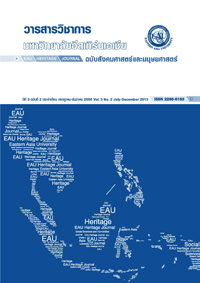กลยุทธ์การบริหารโรงเรียนกวดวิชาเพื่อส่งเสริมความรับผิดชอบต่อสังคม
Keywords:
กลยุทธ์การบริหารโรงเรียนกวดวิชา, ความรับผิดชอบต่อสังคมขององค์กร, ซีเอสอาร์, โรงเรียนกวดวิชา, management strategies of tutorial schools, social corporate responsibility, CSR, tutorial schoolsAbstract
การวิจัยนี้เป็นการวิจัยแบบผสมผสานใช้วิธีการวิจัยเชิงปริมาณตามด้วยการวิจัยเชิงคุณภาพ มีวัตถุประสงค์ (1) เพื่อศึกษาสภาพปัจจุบันและสภาพที่พึงประสงค์ของการบริหารโรงเรียนกวดวิชาตามแนวคิดความรับผิดชอบต่อ สังคมขององค์กร (2) เพื่อวิเคราะห์จุดแข็ง จุดอ่อน โอกาส และภาวะคุกคามของการบริหารโรงเรียนกวดวิชาเพื่อ ส่งเสริมความรับผิดชอบต่อสังคม (3) เพื่อพัฒนากลยุทธ์การบริหารโรงเรียนกวดวิชาเพื่อส่งเสริมความรับผิดชอบ ต่อสังคม ประชากรคือโรงเรียนกวดวิชาที่จดทะเบียนจัดตั้งโรงเรียนกวดวิชาไว้กับสำนักงานคณะกรรมการส่งเสริม การศึกษาเอกชน (สช.) จำนวน 1,664 โรงทั่วประเทศ มีกลุ่มตัวอย่างจากวิธีการสุ่มตัวอย่างแบบแบ่งชั้น จำนวน 313 โรง เก็บข้อมูลเชิงปริมาณด้วยแบบสอบถาม วิเคราะห์ค่าเฉลี่ย ส่วนเบี่ยงเบนมาตรฐาน และคำนวณค่าดัชนี PNIModified แล้วนำมาจัดเรียงความต้องการจำเป็น เพื่อใช้ในการกำหนดร่างกลยุทธ์การบริหารโรงเรียนกวดวิชาเพื่อ ส่งเสริมความรับผิดชอบต่อสังคม โดยใช้วิธีการวิเคราะห์ SWOT Matrix Analysis และปรับแก้ข้อมูลตามผลที่ได้ จากการสัมภาษณ์เชิงลึกจากผู้ทรงคุณวุฒิ 15 ท่าน ผลการวิจัยพบว่า (1) โดยภาพรวมโรงเรียนกวดวิชามีการบริหารงาน ตามแนวคิดความรับผิดชอบต่อสังคมในระดับจริยธรรมและมีจุดเด่นเรื่องมนุษยชนด้วยการปฏิบัติที่ดีต่อบุคลากร ภายในองค์กร ผู้ใช้บริการ และแบ่งปันความรู้สู่ชุมชน (2)โรงเรียนกวดวิชามีจุดแข็งในเรื่องวิชาการ มีหลักสูตร ที่ทันสมัย และการให้บริการที่ดี และ (3) กลยุทธ์ที่โรงเรียนกวดวิชาควรนำไปใช้ในการบริหารโรงเรียนกวดวิชา เพื่อส่งเสริมความรับผิดชอบต่อสังคมขององค์กรมี 4 กลยุทธ์หลัก โดยใช้ชื่อเรียกเป็น SCAN Strategy ได้แก่ (1) กลยุทธ์ยกระดับมาตรฐานโรงเรียนกวดวิชา (2) กลยุทธ์ส่งเสริมภาพลักษณ์และความเชื่อมั่นของโรงเรียนกวดวิชา (3) กลยุทธส์ นับสนนุ กิจกรรมวิชาการและส่งเสริมกจิ กรรมทางวัฒนธรรม และ (4) กลยุทธ์สร้างเครือข่ายความร่วมมือ แบบรอบด้าน
Management Strategies of Tutorial Schools for the Promotion of Corporate Social Responsibility
The objectives of the study are (1) to investigate the current situations and the expected situations of the tutorial school management by social corporate responsibility concept (2) to analyze the strengths, weaknesses, opportunities, and threats of the tutorial school management by social corporate responsibility concept and (3) to develop the management strategies of tutorial schools for the promotion of corporate social responsibility. The population of this study is the tutorial schools enrolling in Office of the Private Education Commission 1,664 in Thailand. The 313 samples were collected by stratified random sampling in order to provide the quantitative data from the questionnaires. The quantitative data were analyzed by mean, standard deviation, and then process by using PNIModified index in order to rank the needs identifications. Furthermore, the strategy was created by applying the SWOT Matrix analysis and gradually modifying the strategy based on the comments derived from in-depth interview of 15 experts. The analysis found that (1) overall, tutorial schools were managing based on the ethic level of corporate social responsibility concept (2) the strengths of tutorial schools were the academics, updated courses, and good services, (3) The management strategies of tutorial schools for the promotion of corporate social responsibility were suggested in four major strategies which are (1) the strategy of raising the tutorial-school standard (2) the strategy of image and confidence promotion of the tutorial school (3) the strategy of academic support and promoting cultural activities strategy and 4) the strategy of creating the collaborative networks.





